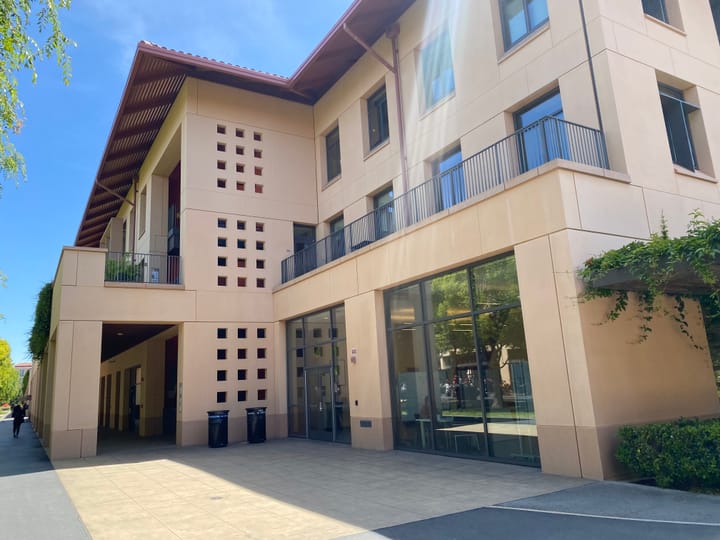Don't Sleep on Part-Time MBA Programs
While everyone obsesses over full-time MBA rankings and debates whether to quit their jobs for b-school, some part-time MBA students are landing the same opportunities.... all while keeping their careers and paychecks intact.

While everyone obsesses over full-time MBA rankings and debates whether to quit their jobs for b-school, some part-time MBA students are landing the same opportunities.... all while keeping their careers and paychecks intact.
After we spoke with Marjorie DeGraca, Executive Director of Admissions for Working Professionals MBA Programs at UC Berkeley Haas, the advantages of top part-time MBA programs like Haas are apparent.
Here's the reality: there is more than one path to your career pivot.
The part-time advantage no one talks about
"At Haas, we always say there are three ways to earn your MBA – and the key is choosing the format that fits your life and goals," DeGraca explains. "What's great is that all three formats – full-time, part-time (Evening & Weekend – EWMBA), and Executive MBA (EMBA) – lead to the exact same MBA degree. Same pool of faculty, same resources, same diploma."
The same degree that costs you two years of income and career momentum can be earned in Haas's part-time program... all while staying employed, building connections, and maintaining your finances.
The math makes sense
"Part-time applicants are definitely becoming more cost-conscious," DeGraca observes. Smart professionals are recognizing that some part-time programs make a lot of financial sense.
Let's take a look at the math:
- Full-time MBA: $200K+ in tuition + $200K+ in lost income = $400K+ total cost
- Part-time MBA: $200K in tuition + continued income and career progression = strong ROI
"For many, full-time is just not viable when you factor in the opportunity cost of lost income," DeGraca notes.
Career pivots aren't only possible – they're actually happening
The "common wisdom" suggests that you need two years away from work to make significant career changes. However, DeGraca's experience – and the Haas cohorts – tell a different story:
"Our students have broken into investment banking, consulting, tech – you name it. One part-time student drove up from LA regularly just to network with investment banks and landed an offer. An executive MBA grad from tech sales made a successful pivot into investment banking. We even had a professional violinist transition into wealth management."
These are real proof that career transformation doesn't require career interruption.
Did these candidates need to hustle? Absolutely. However, it's promising... because it's possible.
Strategic advantages of part-time MBA programs
Expand your professional network while employed
Part-time MBA students have a unique advantage: they're building b-school networks while expanding their professional networks. You're not choosing between your current industry connections and your MBA classmates – you're combining both.
"All our students – across all formats – have access to clubs, career resources, and faculty," DeGraca explains. "The good news is that clubs are aware of our different populations and many now offer virtual options where possible."
Real-world application of learning
Part-time students have the added advantage of applying MBA concepts directly to their current roles – in real time. For example, you're not just learning about strategic planning... but you're also you're implementing it at work and, hopefully, seeing immediate results.
Reduced career risk
Career transitions through part-time programs aren't easy: "It takes hustle," DeGraca admits. But that hustle comes with significantly lower risk. You're exploring new opportunities while earning and income and capitalizing on your career momentum.
The reality of recruiting
At Haas, "All programs share the same office, and companies are increasingly conducting virtual interviews, which levels the playing field," DeGraca notes.
Additionally, the recruiting infrastructure is identical. The difference is approach, not access. Part-time students might need to be more strategic about networking events and interviews, but they're competing for the same roles with the same support systems.
Of course, this is not true of EVERY part-time MBA program. Do your diligence, and see what makes sense for you and your situation.
Strategic considerations for career changers
Industry pivots
The most successful career changers in part-time programs are strategic about their transitions. They're:
- Using current roles to build transferable skills
- Networking strategically within their target industries
- Leveraging MBA coursework to demonstrate their interest and competency
- Timing their pivot for maximum impact
DeGraca's example of a professional violinist transitioning into wealth management illustrates the power of a strategic career pivot. This wasn't about abandoning a creative career – it was about leveraging transferable skills and the business acumen developed through an MBA program.
The advantages of geography and flexibility
Location independence
Part-time and executive programs increasingly offer location flexibility that full-time programs generally can't match. You can access a top-tier business education without relocating your life. "We've also grown our Flex format to make Haas more accessible to professionals across the U.S. and beyond," DeGraca explains.
Life integration, rather than disruption
Full-time programs require you to reorganize your life around business school. On the other hand, part-time programs integrate b-school into your existing life and career. For some, that's extremely attractive.
When part-time makes strategic sense
You're already on a strong career trajectory
If you're advancing in your career and want to accelerate that trajectory without derailing your progress, part-time programs could offer the ideal solution.
You have financial obligations
If you have a family, mortgage payments, or simply prefer income stability, part-time programs could make a lot of financial sense.
You want to test career ideas before committing
Part-time programs allow you to explore through coursework, networking, and projects before making complete career changes.
Parting thoughts
Of course, not all part-time programs offer the same benefits as Haas. "If you want a top-tier MBA that works with your life, we're one of the few places offering a truly unified experience in multiple formats," says DeGraca.
Your career situation, location, and flexibility (or lack thereof) will play a factor in determining whether a part-time MBA is right for you. For some candidates, they combine benefits that full-time programs just don't have.
Based on exclusive interview with Marjorie DeGraca, Executive Director of Admissions for Working Professionals MBA Programs at UC Berkeley Haas. For more insider insights on admissions, MBA programs, and career strategy, sign up for our newsletter.



